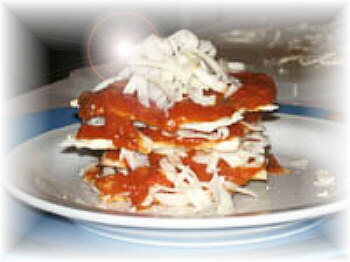 June 06
June 06
Goldbergers and Cheeseburgers: Food and Particularism among American Jews
by Leah Koenig
p. 2 of 2
Jews’ interaction with Jewish food and food traditions plays a revealing role in this most recent transformation of American Jewish life. The Manischewitz brought to the party, for example, was a tongue-in-cheek but also (perhaps subconsciously) sincere way of asserting Jewish identity and community. Another friend of mine threw a latke making party at Chanukah – an event which was decidedly designed to bring together Jews to celebrate and create Jewish food. Other Jews, though perhaps still a considerable minority – are seeking out a Jewish foundation for their ethical food choices. For example, a growing number of Jewish vegetarians link their abstinence from meat to Jewish values.  Some – echoing Rabbi Arthur Waskow’s idea of “eco-kosher” – are also beginning to examine and reframe what it means for food to be “fit” in a world where heavy pesticide use, factory farms and conventional monocropping techniques dominate our food and agricultural systems. And the organization I work for, Hazon has pioneered several projects, which enable participants to examine food through the double prism of Jewish tradition and contemporary food issues. Through their food choices, these Jews are attempting to find ways that their ancient, inherited tradition can breathe new meaning into their modern lives.
Some – echoing Rabbi Arthur Waskow’s idea of “eco-kosher” – are also beginning to examine and reframe what it means for food to be “fit” in a world where heavy pesticide use, factory farms and conventional monocropping techniques dominate our food and agricultural systems. And the organization I work for, Hazon has pioneered several projects, which enable participants to examine food through the double prism of Jewish tradition and contemporary food issues. Through their food choices, these Jews are attempting to find ways that their ancient, inherited tradition can breathe new meaning into their modern lives.
3. Different, but not Separate
But what about the function of traditional kashrut (as a religious, not only cultural) Jewish food practice deliberately to separate Jews from non-Jews? Here, I, along with many of my culturally Jewish peers, part company with our more Torah-observant compatriots. Despite their embrace of Jewish particularity, contemporary cultural Jews are less willing than many traditionally observant ones to compromise their various other identities. On the one hand, yes, they are bored with the hyper-universalistic, “we are the world” sentiment, they grew up with, which attempts to blend all cultural particularities into a single muddled patchwork. But they are cautious about the areas in Jewish life that tend towards self-segregation and seem to purposefully deny meaningful contact with the much larger, non-Jewish world. They roll their eyes at people who insist upon dogmatic or narrowly defined Jewish boundaries, like the woman at the conference who balked at my bacon story. They are comfortable trying out the rituals that highlight Jewish tradition’s uniqueness, but wary of the ones that ask them to separate themselves from non-Jews or less-observant Jews (e.g. declining an invitation to their friends’ barbeque because it will not be kosher). They desire the familiarity of home-cooked kugel, but want to be able to enjoy their “transgressions” – without guilt.
Separation – some scholars say, is a central, not incidental, aspect of kashrut, though few would identify it as the only aspect. Deuteronomy 14:2-3 says, “For thou art a holy people unto thy God, and God hath chosen thee to be his own treasure out of all peoples, that are upon the face of the earth. Thou shalt not eat any abominable thing…” The Israelites, it seems, made a connection between their chosenness and their consumption (as well as their sexual relations and other customs prescribed in Deuteronomy, and in Leviticus in the Holiness Code). Cultural anthropologist, Mary Douglas, elaborated on the connection between holiness and separation in her book Purity and Danger, by explaining how food prohibitions created a set of boundaries, which rendered anything outside of those boundaries as unfit. By setting prescribed boundaries which hindered eating and socialization with non-Jews, the laws of Kashrut helped these ancient Jews assert their distinct identity – which, for a tiny, vulnerable minority, had considerable benefits.
Today, most Jews do not share the ancient Israelites’ intense need for identity separation. This change does not render the laws of kashrut irrelevant, but the lack of desire to separate does make them seem less crucial for the survival of the Jewish people. Contemporary Jews have the relative freedom to weigh their Jewish and not-explicitly Jewish values against one another in making personal ethical and ritual decisions. And many Jews – whether or not they would articulate it as such – choose to privilege their values of unhindered diverse friendship and community over traditional Jewish law. One can argue that these less-observant Jews choose not to keep kosher simply because it easier – that they just cannot be bothered with restrictions against shrimp or, in my brother’s case, bacon. I think that is a fair argument; there is no question that not keeping kosher is easier then abiding by the laws, and that it gives Jews access to a wider array of food choices. But it comes with a price as well: in a country where many Jews live and have relationships outside of all-Jewish contexts, keeping strict kosher can make sharing meals and friendships difficult.
It is of course possible – if more complicated – for Jews who do follow more observant food rituals or laws to strike a balance between particularism and universalism. Blu Greenberg wrote in How to Run a Traditional Jewish Household, about how she negotiates kashrut’s distinctive eating laws and practices on the one hand, and the values of friendship and respectful contact with non-Jews or nonobservant Jews on the other. In one anecdote she describes how she and her husband, Rabbi Yitz Greenberg, devised a method of asking restaurants to double wrap a portion of fish in foil before putting it into a non-kosher oven, and not opening it until it was at the table, where the Greenbergs would provide their own cutlery. This technique, she says, enables them to eat with anyone and at virtually any restaurant in the world. The Greenbergs seem to have found a method that allows them to have their cake and eat it too. But ultimately, even despite their good intentions, a gap is created between themselves and their (potentially silently embarrassed or irritated) hosts. Under the right circumstances, this gap can lead to an even stronger bond of understanding and friendship. But more often, I think, this gap is why so many contemporary Jews do not keep kosher or participate in Jewish rituals that “limit” them from the non or less-observant Jewish world.
My own eating choices indicate a hesitation to separate myself from the larger world. I became a vegetarian at the age of 17, because I was concerned with the amount of resources (corn/grain, water, land) that were diverted towards feeding animals – and wasted – in order to feed people. As I have grown more fully into my own Jewish identity, I added a second level of significance onto my vegetarianism – that of being “kosher by default.” Although keeping kosher was not originally part of my choice to stop eating meat, it has become a significant part of the reasoning I use to explain my dietary choice to myself and others. I am generally pleased that my vegetarianism stops me from eating pork, shellfish, or mixing milk and meat. I am not comfortable, however, with moving beyond this admittedly “kosher-lite” lifestyle - for example, if my eating habits limited my ability to share a meal with friends or family. Similarly, my two-year stretch as a vegan ended partly because I felt like every meal I ate with other people ostracized me. Although I do maintain my own set of vegetarian standards, I have come to value a shared table over morally condemning someone for their choice to eat meat, or trying to convince them otherwise. Unlike keeping strictly kosher, where virtually an entire meal could be off-limits if butter and meat are served at the same table, being vegetarian still allows me to sit at the table and choose from the dishes that do not include meat. And even though a strict level of kashrut observance (or strict vegetarian eating) does not necessarily separate the eaters from their family, it can – and often does – separate them from eating in their family’s home.
In aggregate, the significance and meaning of kashrut is different today from the world of our parents, and our grandparents (as well as our ancient ancestors). Within the relative acceptance of a universalistic society, the particularities of Jewish tradition and culture are neither an obligation nor a curse, but a joy. However, particularism within a pluralistic context requires a much more complicated level of decision-making and identity construction than either parochialism or assimilationism. Through our personal and communal negotiations with food and community – as “out” Jews and as world citizens – Jews seeking both the cultural comforts of home and the multicultural community of the wider world are creating the lived Jewish rituals that following generations will revere (or reject) as tradition.
Fast forward 25 or 50 years from now: The children and grandchildren of this generation of Jews will be young adults. With any luck, they will be seeking to find their own connections and contemporary relevance in their ancient, inherited traditions. Will they seek the same comfort and relation to Jewish foods that this generation does? Will they still feel a cultural or familial link to the heavy, shmaltz-fried recipes their great and great-great grandparents treasured? Or will the nostalgia for grandpa’s famous egg cream have faded, the recipe forgotten in a dusty box in the attic?  More importantly, does it even matter? What is really being preserved through the transmission of traditional Jewish recipes and food rituals l’dor v’dor (from generation to generation)?
More importantly, does it even matter? What is really being preserved through the transmission of traditional Jewish recipes and food rituals l’dor v’dor (from generation to generation)?
The answer, I think, lies not in the particular borscht, latke, or strip of lox itself, but in the lasting connective power of food. The definition of “traditional Jewish food” is changing, and will continue to change along with the people who create it. Some of the Eastern European Jewish foods commonly identified as Jewish will linger on, some will be lost completely, and some will become hybridized with foods from other cultures - just like borscht, latkes, and lox originally were. The question is not one of the recipes but of the meanings invested in them. My grandchildren, for example, might someday remark that Pesach is not Pesach without grandma Leah’s spinach matzah lasagna, or look back fondly at the lox sushi their parents served every week at Shabbat lunch. What is important – both in food and in the rest of Jewish life – is that the value of "authentically Jewish" is maintained, even as its contents shift: that the memories and values of Jewish life are passed on, for new generations to struggle with, redefine and make their own.
Leah Koenig is an assistant editor at Zeek, and also works for Hazon. She lives in Brooklyn.









